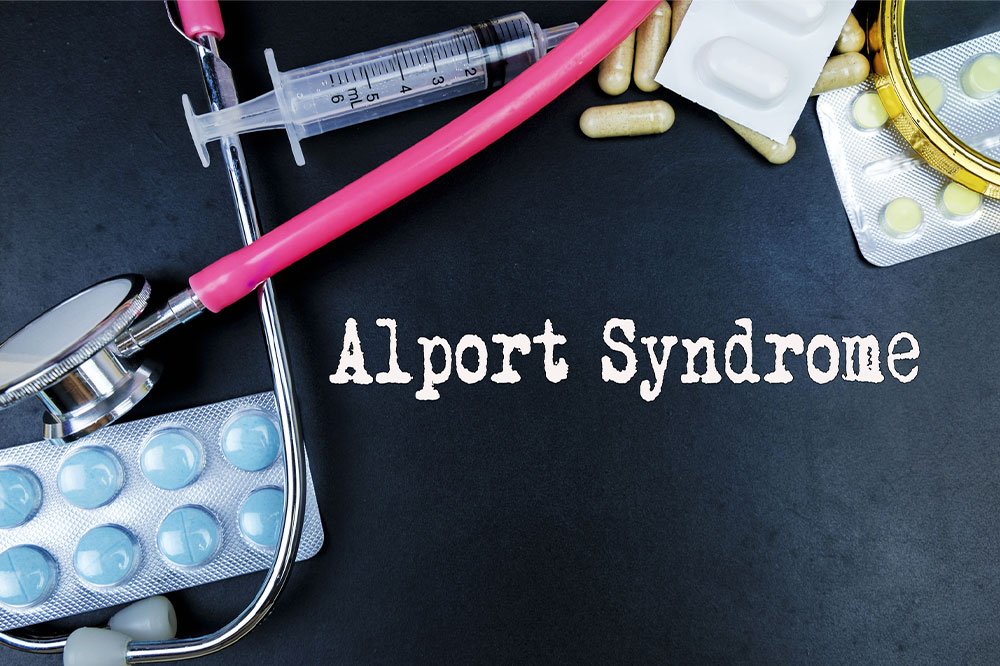
Causes, symptoms, and diagnosis for Alport syndrome
Alport syndrome is a result of a genetic mutation in one of the genes that create collagen. This condition can be inherited and leads to vision concerns, eye pain, hearing loss, and kidney diseases. It is also associated with some types of blood vessel problems and tumors. This rare disease affects 1 in every 50,000 newborns. Alport syndrome has no cure, but doctors can help avoid damage to organs like ears, eyes, and kidneys.
Causes
Alport syndrome affects the gene that produces IV collagen-type protein, which makes crucial ear, kidney, and eye tissue components. There are several ways in which the Alport Syndrome is passed on in families:
X-linked inheritance is passed from a mother with Alport Syndrome to her son.
Autosomal recessive inheritance is when both parents have the mutation to pass it to the children.
Autosomal dominant inheritance is when one side of the family has the mutation to pass it to the children.
Symptoms
Typically, the symptoms of Alport syndrome are characterized by kidney and urinary-related symptoms. It may also result in abnormal blood vessels, smooth muscle tumors, and eye and ear symptoms.
Kidney and urinary-related signs
You may see urinary signs, such as blood in the urine, early on since your childhood. However, in some people, they may occur later, such as frothy urine, swelling of the body, and high blood pressure.
Eye and ear symptoms
Symptoms related to the eyes and ears may also show in Alport syndrome, such as:
Eye pain that results from harm to the cornea, the transparent outer layer of the eye.
Cataract, a condition wherein the eye’s clear lens becomes cloudy and lowers the degree of light entering an eye, results in vision changes or blurry sight. Furthermore, changes at the back of the eye that typically help focus the image can also result in vision loss.
Individuals with Alport syndrome might experience hearing impairment in both ears. It typically involves difficulty hearing high-frequency sounds, which progresses to an inability to comprehend speech. Hearing loss usually starts during childhood and worsens in adulthood.
Smooth muscle tumors
Some people with the disease might develop painless, non-cancerous tumors in the smooth muscle, called leiomyomas. These tumors happen in the female reproductive, gastrointestinal, or respiratory system. Typically, these tumors intervene with everyday functions like fertility, digestion, and breathing.
Abnormal blood vessels
In some rare cases, Alport syndrome might result in the expansion of sections of the major blood vessel that exits the heart. While typically asymptomatic, it may result in a rupture risk or discomfort if the bulges are too extensive.
Diagnosis
Your healthcare provider will typically ask questions about your symptoms and then examine you for diagnosis. Some of the tests that can help with the diagnosis are:
Renal biopsy
Complete blood count
Serum creatinine and BUN
Urinalysis
Beyond this, if your healthcare professional suspects Alport syndrome, you may also have to undergo hearing and vision tests.
Treatment options
There is no one universal treatment option for Alport syndrome since the complications and signs have separate treatment methods and remedies. Given below are some treatment options for side effects of Alport syndrome.
Kidney diseases
Slowing the progression and managing kidney disease is usually the primary consideration for treating Alport syndrome. To do so, the healthcare provider may prescribe the following:
A low-protein food regime
Limited salt intake food regime
Angiotensin receptor blockers or Angiotensin-converting enzyme (ACE) inhibitors to lower the protein in your urine or reduce the kidney disease progression
Your doctor may recommend seeing a nutritionist or sticking to new limitations while eating healthy. In some people, kidney disease might progress to end-stage renal disease. Hence, the doctor may recommend treatment options like a kidney transplant or dialysis.
High blood pressure
Doctors might recommend treatments to keep your blood pressure in check. These include calcium channel blockers, beta-blockers, and ACE inhibitors that diminish your susceptibility to heart diseases and curtail kidney disease progression.
Hearing loss
When you get hearing loss because of Alport syndrome, it is mostly permanent. However, hearing aids can be an effective solution in specific scenarios.
Eye problems
The healthcare professional might recommend visiting an ophthalmologist to tackle vision issues. If the problems arise from an abnormality in the lens shape, you may have to undergo cataract surgery or change the prescription of the glasses. Since the white eye flecks do not hamper your vision, you may not have to undergo specialized treatment.




